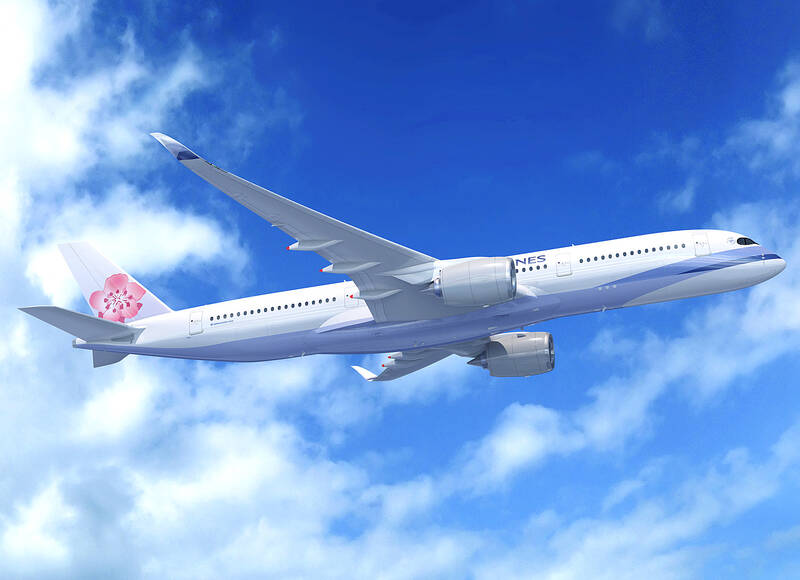China Airlines Ltd (CAL, 中華航空) on Friday posted its highest first-quarter net profit, which it attributed strong travel demand during the Lunar New Year holiday and the winter vacation.
The airline recorded a net profit of NT$4.66 billion (US$153.75 million) in the January-to-March period, a 36.54 percent year-on-year increase, with earnings per share rising from NT$0.51 a year earlier to NT$0.69, CAL said in a statement.
CAL said it generated NT$52.77 billion in consolidated sales, up from NT$48.65 billion a year earlier.

Photo courtesy of China Airlines Ltd
The boom in passenger flights in the post COVID-19 era also continued into the quarter, with passenger revenue reaching NT$32.69 billion, up 12.3 percent from the previous quarter, it said.
CAL said that it plans to capitalize on the expected strong demand during summer vacation by increasing the number of round-trip flights to destinations such as Takamatsu and Kagoshima in Japan, Seoul and Busan in South Korea, Vienna, Jakarta and Ho Chi Minh City.
The airline currently provides the most number of flights to Europe and Australia among Taiwanese carriers.
Meanwhile, CAL said that revenue from cargo services rose 27.46 percent year-on-year to NT$15.69 billion, boosted by its expanded services to meet the growing demand for air cargo services.
In response to the US’ new tariffs, CAL said it has adjusted its cargo flight schedules, while optimizing its cargo flight portfolio in a bid to enhance competitiveness and maintain the bottom line of its cargo operations.
CAL said it last week signed an agreement to purchase at least 14 Boeing Co 777X jets — 10 777-9 passenger jetliners and four 777-8F freighters — and that it has the option to buy an additional nine Boeing aircraft.
It expects the delivery of its first Boeing 777X aircraft in 2030, it said.

The DBS Foundation yesterday announced the launch of two flagship programs, “Silver Motion” and “Happier Caregiver, Healthier Seniors,” in partnership with CCILU Ltd, Hondao Senior Citizens’ Welfare Foundation and the Garden of Hope Foundation to help Taiwan face the challenges of a rapidly aging population. The foundation said it would invest S$4.91 million (US$3.8 million) over three years to foster inclusion and resilience in an aging society. “Aging may bring challenges, but it also brings opportunities. With many Asian markets rapidly becoming super-aged, the DBS Foundation is working with a regional ecosystem of like-minded partners across the private, public and people sectors

Taiwan Semiconductor Manufacturing Co (TSMC, 台積電) has secured three construction permits for its plan to build a state-of-the-art A14 wafer fab in Taichung, and is likely to start construction soon, the Central Taiwan Science Park Bureau said yesterday. Speaking with CNA, Wang Chun-chieh (王俊傑), deputy director general of the science park bureau, said the world’s largest contract chipmaker has received three construction permits — one to build a fab to roll out sophisticated chips, another to build a central utility plant to provide water and electricity for the facility and the other to build three office buildings. With the three permits, TSMC

BREAKTHROUGH TECH: Powertech expects its fan-out PLP system to become mainstream, saying it can offer three-times greater production throughput Chip packaging service provider Powertech Technology Inc (力成科技) plans to more than double its capital expenditures next year to more than NT$40 billion (US$1.31 billion) as demand for its new panel-level packaging (PLP) technology, primarily used in chips for artificial intelligence (AI) applications, has greatly exceeded what it can supply. A significant portion of the budget, about US$1 billion, would be earmarked for fan-out PLP technology, Powertech told investors yesterday. Its heavy investment in fan-out PLP technology over the past 10 years is expected to bear fruit in 2027 after the technology enters volume production, it said, adding that the tech would

YEAR-END BOOST: The holiday shopping season in the US and Europe, combined with rising demand for AI applications, is expected to drive exports to a new high, the NDC said Taiwan’s business climate monitor improved last month, transitioning from steady growth for the first time in five months, as robust global demand for artificial intelligence (AI) products and new iPhone shipments boosted exports and corporate sales, the National Development Council (NDC) said yesterday. The council uses a five-color system to measure the nation’s economic state, with “green” indicating steady growth, “red” suggesting a boom and “blue” reflecting a recession. “Yellow-red” and “yellow-blue” suggest a transition to a stronger or weaker condition. The total score of the monitor’s composite index rose to 35 points from a revised 31 in August, ending a four-month